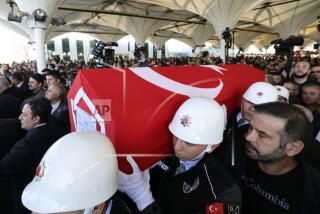TERRORISM : Amid Turkish Repression, Kurdish Nationalism Rises
- Share via
ANKARA, Turkey — Raiders slammed into the sleeping village of Altinova under a harvest moon one night this month. They shot 10 animals, torched stacks of newly mown hay, burned the village bus, ransacked the City Hall and set fire to 16 houses. Nine villagers died in one of them.
Turkish authorities lamented that Altinova had been attacked by guerrillas of the separatist Kurdistan Workers Party, the PKK.
Villagers tell another story in a report filed to the Turkish Parliament. They say the raiders, who arrived in tanks and personnel carriers, were government troops come to avenge the death of a warrant officer in a clash with the PKK outside the village.
Altinova is one ember in a firestorm of violence that is sweeping the Kurdish lands of eastern Turkey. It is a part of the smoky national debate over the future for Turkey’s 12 million Kurds.
As visiting Prime Minister Tansu Ciller lunches at the American White House today, her government is whipsawed by the growing rebellion and under censure from international human rights groups decrying abuses committed in a military drive to crush it.
The Syrian-supported Marxist guerrillas have been fighting since 1984 in an insurgency that has already claimed around 7,500 lives--1,600 of them since May, 230 of them, mostly civilians, this month alone.
The PKK are terrorists who kill without mercy and have recently begun polishing their international profile by taking foreign tourists as hostages. But human rights watchdogs say government forces pursuing them are guilty of even greater abuses: About 1,000 villages have been forcibly evacuated. In one Kurdish town, Batman, there have been around 300 death-squad-type murders.
As repression increases, so, in backlash, does popular support for nationalism among Kurds, an Indo-European people who live throughout a country that long officially denied their existence as a separate ethnic group.
There have been some changes. Government documents now refer to Turkey as an ethnic mosaic, politicians recognize the “Kurdish reality,” an official ban on the Kurdish language was lifted in 1991, and some periodicals publish in Kurdish.
But reform has always lagged behind Kurdish nationalist demands.
“The struggle has brought the Kurdish problem to the Turkish agenda. We would not have come this far without it,” said Remzi Kartal, 45, a dentist and leader of 17 Kurdish nationalist deputies in the Parliament. Eighteen were elected, but one, Mehmet Sincar, was killed while on a fact-finding mission in Batman last month. Kartal says that 59 party officials have been killed in the past two years.
“The question is not of a Kurdish state but of a free and decent life,” Kartal said in an interview. “We no longer choose to live without an identity. If there is no possibility to live within Turkey, the question of splitting clearly will come to the agenda.”
Some Turkish intellectuals, government officials and editors believe that besides combatting guerrillas, Turkey should address the Kurdish issue in a broad social and economic context. They urge reforms to allow greater local autonomy and perhaps some type of Spanish-style regionalism.
That minority view is shouted down by hawks who speak for a majority of Turks. They argue that ceding to Kurdish demands would call into question the founding unitary principles of modern Turkey.
“There is no other solution but the form of struggle in practice today,” President Suleyman Demirel said recently, echoing the hard line that has its firmest base in the armed forces. “There is no other way but to take the guns out of the hands of armed men in the mountains.”
With the government rejecting accommodation and new recruits streaming steadily to guerrilla standards, the battle lines are now more starkly drawn than at any time since the insurgency began.
“I am frightened; we are all frightened. We are expecting horrible things,” Kartal said.
More to Read
Sign up for Essential California
The most important California stories and recommendations in your inbox every morning.
You may occasionally receive promotional content from the Los Angeles Times.













